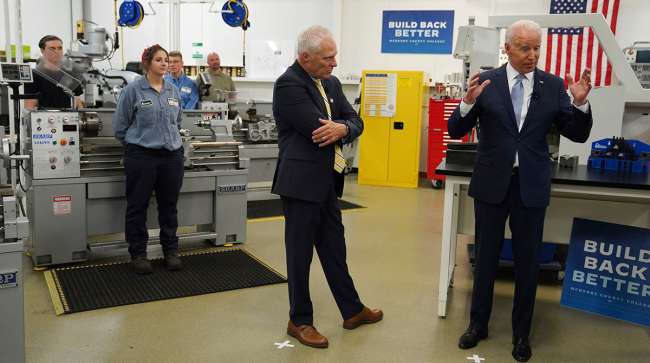Senior Reporter
Biden Promotes Infrastructure Plan as Congress Prepares Policy Agenda

[Stay on top of transportation news: Get TTNews in your inbox.]
President Joe Biden pressed Congress to legislate on the infrastructure policy aspects of his domestic agenda as lawmakers return to Washington from their July 4 recess.
At a community college in Crystal Lake, Ill., the president promoted potential benefits of his $1.2 trillion infrastructure policy framework, which has been endorsed by a bipartisan group of senators.
“Under a bipartisan infrastructure agreement, we’re going to make the biggest investment in roads and bridges since the construction of the interstate highway system, literally creating millions of good-paying jobs,” Biden said July 7. “I’m going to be making the case to the American people until the job is done, until we bring this bipartisan deal home; until we meet the needs of families today and the economy of tomorrow.”
The framework aims to authorize $109 billion for roads and bridges, $66 billion for passenger and freight rail operations and $49 billion for public transit systems. Additionally, it would allocate $47 billion for severe-weather infrastructure resilience projects to respond to climate change. White House press secretary Jen Psaki told reporters she anticipates the House and Senate to be consumed with an infrastructure-centric agenda when the chambers continue with their legislative tasks on July 12.
“Obviously there’s a lot of work that needs to happen with Congress, and we expect, over the next week, there to be a lot of behind-the-scenes bill writing, negotiations, discussions on Capitol Hill,” said Psaki the day before the president’s address in Illinois. “We’ll be closely engaged and closely discussing with members who are writing the legislation.”
Democratic leaders have about three weeks before their August recess to kick off consideration of the president’s infrastructure policy deal, as well as advance transportation funding legislation for fiscal 2022. Senate Majority Leader Chuck Schumer (D-N.Y.) signaled the potential for considering a big-ticket bipartisan infrastructure framework as early as this month.
“Discussions about infrastructure are moving along forward nicely,” Schumer said recently. “I’d like to get this done as soon as possible.” Schumer has not scheduled consideration of a separate budget-centric “human infrastructure” bill that would fund social and equity programs, or a comprehensive highway policy legislation. On July 1, the House advanced a $715 billion, five-year bill that would provide $343 billion for roads, bridges and safety, $109 billion for transit and $95 billion for freight and passenger rail.
Republican leaders have pushed back on the suggestion of combining a big-ticket infrastructure bill with so-called “human infrastructure” budget-centric legislation. As Senate Minority Leader Mitch McConnell (R-Ky.) put it, “Republicans have been negotiating in bipartisan good faith to meet the real infrastructure needs of our nation. The president cannot let congressional Democrats hold a bipartisan bill hostage over a separate and partisan process.”
Meanwhile, a bipartisan group of House lawmakers announced their endorsement of Biden’s comprehensive bipartisan deal. The 58-member House Problem Solvers Caucus had unveiled a $1.25 trillion, eight-year infrastructure spending framework earlier this year.
“The bipartisan Problem Solvers Caucus strongly supports the Senate infrastructure framework, which is closely aligned with our own ‘building bridges’ proposal released last month. In light of the bipartisan, bicameral genesis of the framework, we encourage an expeditious, stand-alone vote in the House and thank our bipartisan Senate partners and the Biden administration for working so closely with us to demonstrate that cooperation is still possible in Washington,” the group said July 6.
On the House side, Appropriations Committee Chairwoman Rosa DeLauro (D-Conn.) is proceeding with a fiscal 2022 transportation funding bill. The House Transportation, and Housing and Urban Development, and Related Agencies Appropriations Subcommittee scheduled its consideration for July 16. DeLauro and her colleagues explained their aim is to present the president with a transportation funding bill before the new fiscal year, which begins Oct. 1.

DeLauro
“After decades of disinvestment and the devastation of the coronavirus pandemic, the American economy is seriously out of balance, favoring the wealthy and well-connected and leaving working families behind,” said DeLauro. “With our funding bills this year, we will invest in the American people: creating good-paying jobs, growing opportunity, and providing a lifeline to the middle class, working families, small businesses and the vulnerable.”
The president’s fiscal 2022 budget calls for a discretionary request of $25.7 billion for the U.S. Department of Transportation, which would be a 14.8% increase for the department’s discretionary programs.
Want more news? Listen to today's daily briefing below or go here for more info:




